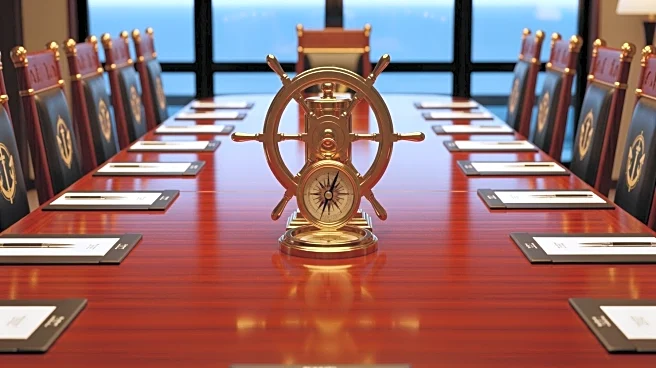What's Happening?
The International Maritime Organization (IMO) is holding its 35th General Session at its London headquarters, where delegates will vote to elect 20 Category C members of the IMO's Council. This election is significant as it involves 26 countries vying
for these seats, including six new candidates: Belgium, Nigeria, Oman, Pakistan, South Africa, and Thailand. The existing 20 Category C members are seeking re-election, having served for the past two years. Category C members are chosen based on their special maritime interests or to ensure balanced geographic representation. Oman is highlighted as a strong candidate due to its strategic position in the Straits of Hormuz and its diplomatic capabilities, which could be beneficial in managing global maritime affairs.
Why It's Important?
The election of Category C members to the IMO Council is crucial for shaping global maritime policies and ensuring diverse representation. Countries like Oman, with its strategic location and diplomatic skills, could play a pivotal role in addressing maritime security challenges, such as those posed by the Houthis in the Red Sea and Gulf of Aden. The inclusion of new members like Nigeria and South Africa could enhance African representation, while Thailand's broad trading links could contribute to international maritime cooperation. These elections will influence the direction of maritime governance and the management of international shipping routes, impacting global trade and security.
What's Next?
Following the elections, the newly elected Category C members will begin their term, contributing to the IMO's efforts in maritime governance. The focus will likely be on enhancing security in critical shipping lanes and fostering international cooperation. Countries like Oman may leverage their diplomatic relations to mediate conflicts and ensure safe passage through strategic waterways. The IMO Council will continue to address global maritime challenges, including environmental concerns and shipping safety, with input from the diverse representation of its members.
Beyond the Headlines
The election process highlights the geopolitical dynamics within the IMO, as countries seek to influence maritime policies that align with their national interests. The strategic importance of the Straits of Hormuz and the Red Sea underscores the need for effective maritime governance. Oman's potential role in mediating conflicts and ensuring navigational safety could set a precedent for how diplomatic skills are valued in international maritime affairs. The elections also reflect broader efforts to balance regional representation and address global maritime challenges collaboratively.

















